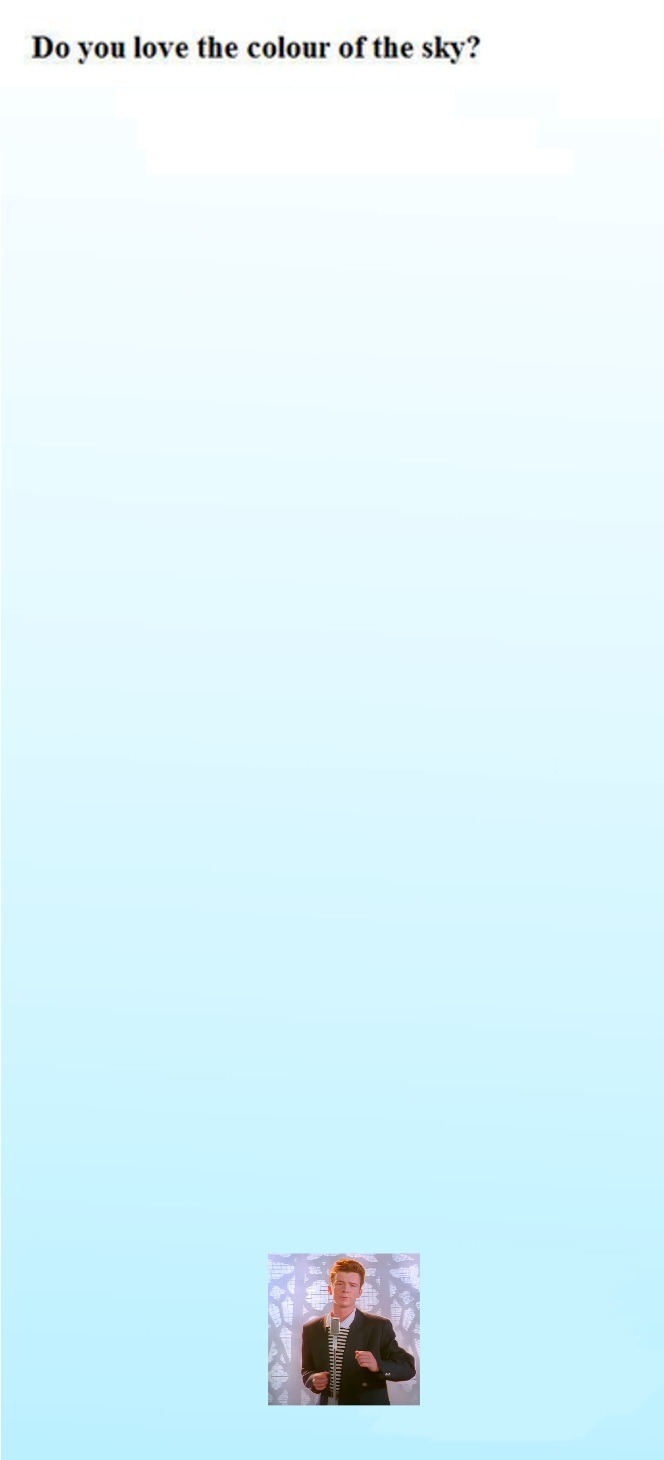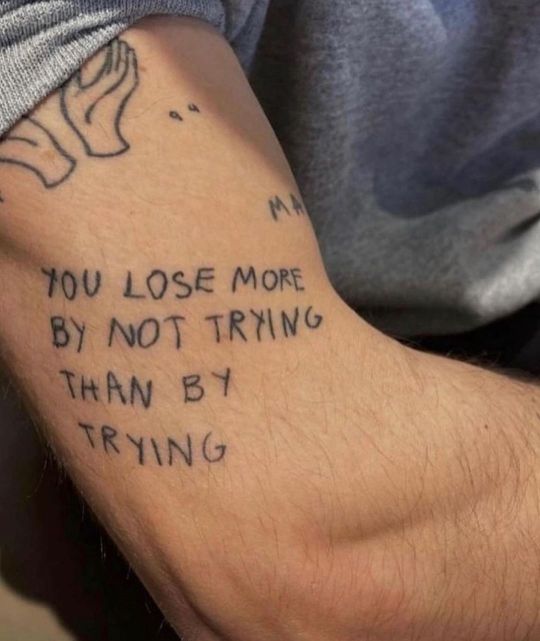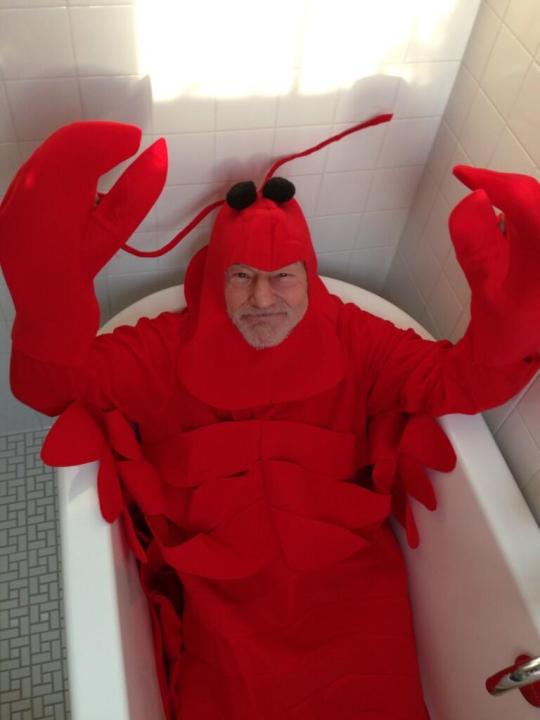Text
Friends, I think we need to talk about Covid.
I want to get a few caveats out there before I start:
I am aware that there are people who need to exercise extreme caution about Covid; I live with someone who has two solid organ transplants and who is at the most immune compromised level of immune compromised. *I* have to be extremely cautious about covid.
Masking does prevent a certain level of transmission, and people who think they may have covid should mask and people who are concerned that they may be at high risk for covid should mask.
You should be vaccinated and boosted with the most recent vaccines that are available to you; covid is highly transmissible and very serious, you do not want to get covid and if you do get covid you don't want it to be severe and if you do get covid you don't want to give someone else covid and up-to-date vaccinations are the best way to reduce transmission and help to prevent severe cases of Covid.
We should be testing before going to any gatherings, and informing people if we test positive after gatherings, and testing if we suspect we have been exposed.
It is bullshit that there aren't good protections for workers who have covid; you should not be expected to go to work when you are testing positive
It is bullshit that people who are testing positive are not isolating for other reasons; if you have Covid you should not be going out and exposing other people to it even if you are experiencing mild symptoms or no symptoms.
We do need better ventilation systems for many kinds of spaces. Schools need better ventilation, restaurants need better ventilation, doctor's offices and hospitals and office buildings need better ventilation and better ventilation can reduce covid transmission.
I want to make it clear that Covid is real and there are real steps that individuals and systems can take to prevent transmission, and that there are systems that are exerting pressures that needlessly expose people to covid (the fact that you can lose your job if you don't come in when you're testing positive, mainly; also the fact that covid rapid tests should be ubiquitous and cheap/free and are not).
All of that being said: I'm seeing some posts circulating about how we're at an extremely high level of transmission and the REAL pandemic is being hidden from us and, friends, I'm pretty sure that is just incorrect and we're spreading misinformation.
I'm thinking of this video in particular, in which the claim is made that "your mystery illness is covid" in spite of negative tests. The guy in the video says that there's nothing else that millions of people could be getting a day, and that he predicted this because a wastewater spike in December meant that there was a huge spike in cases.
I've also seen people saying that deaths are where they were in 2021-2022, and that we're still at "a 9/11 a week" of excess deaths and friends, I'm not seeing great evidence for any of these claims.
I know that we (in the US, which is where the numbers I'm going to be citing are from) feel abandoned by the CDC and the fact that tracking cut off in May of 2023. But that only cut off for the federal tracking.
I live in LA county and LA county sure as shit is still tracking Covid.
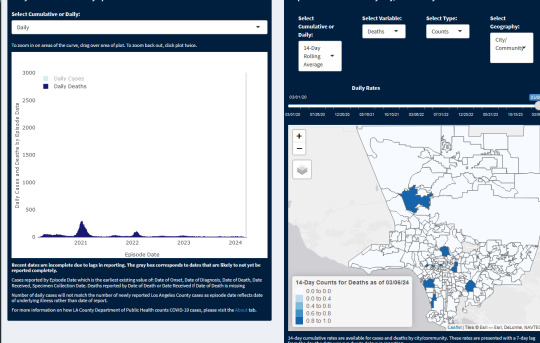
If you want a clearer picture, you can see the daily case count over time compared to the daily death count:
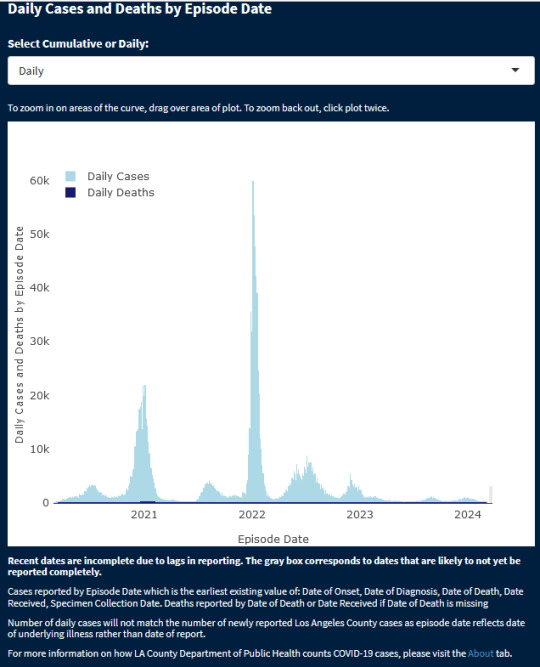
Okay, you might say, but that's just LA.
Alright, so here's Detroit:
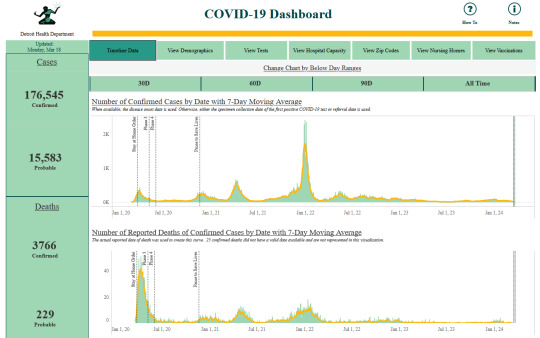
Right, but maybe that's CDC data and you don't trust the CDC at this point.
Okay, here's fatalities in New York tracked through New York's state data collection:
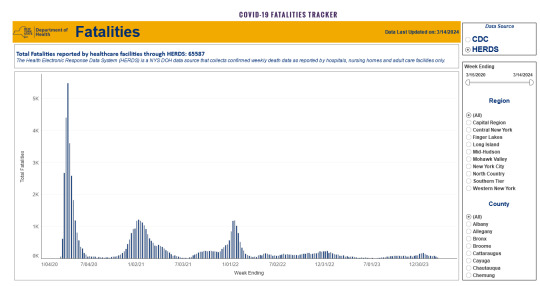
It's harder to toggle around the site for South Dakota, but you can compare their cases and hospitalizations and deaths for early 2022
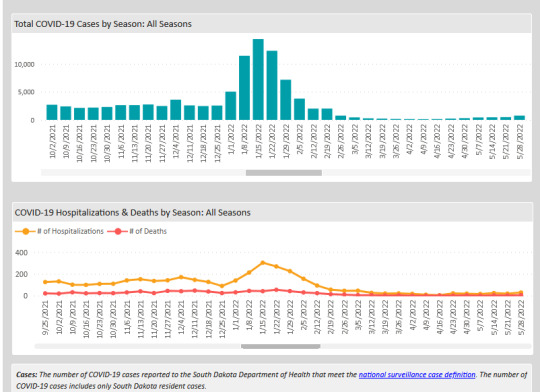
To cases and hospitalizations and deaths from early 2024
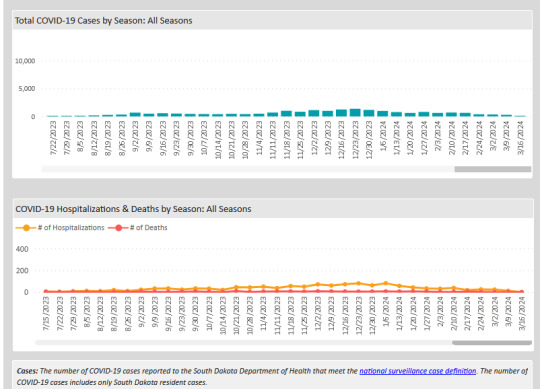
And see that there's really no comparison.
Okay, you might say, but people are testing less. If they're testing less of course we're not seeing spikes, and they're testing less because fewer tests are available.
Alright, people are definitely testing less than they were in 2021 and 2022. Hospitalization for Covid is probably the most clear metric because you know those people have covid for sure, the couldn't not test for it.
Here are hospitalizations over time for LA:

Here are hospitalizations over time for New York:
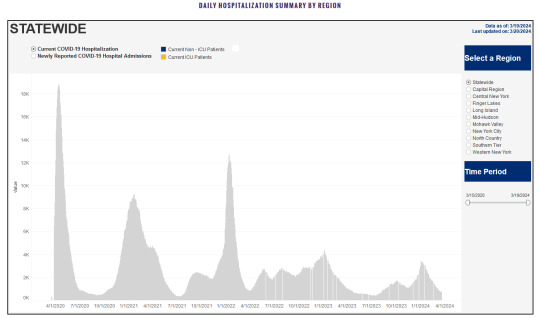
As vaccination rates have gone up, cases, deaths, and hospitalizations have gone down. It IS clear that there are case spikes in the winter, when it is cold and people are indoors in poorly ventilated spaces and people are more susceptible to respiratory infections as a result of cold air weakening the protection offered by our mucous membranes, and that is something that we will have to take precautions about for the forseeable future, just as we should have always been taking similar precautions during flu season.
So I want to go point-by-point through some of the arguments made in that video because I'm seeing a bunch of people talking about how "THEY" don't want you to know about the virus surge and buds that is just straight up conspiracism.
So okay, first off, most of what that video is based on is spikes in wastewater data, not spikes in cases. This is because people don't trust CDC data on cases, but I'd say to maybe check out your regional data on cases. I don't actually trust the CDC that much, but I know people who do tracking of hospitalizations in LA county, I trust them a lot more. Wastewater data does correlate with increases in cases, but this "second largest spike of the entire pandemic" thing is misleading; wastewater reporting is pretty highly variable and you can't just accept that a large spike in covid in wastewater means that we're in just as bad a place in the pandemic as we were in 2022. We simply have not seen the surge of hospitalizations and deaths that we would expect to see in the weeks following that spike in wastewater data if wastewater data was reflective of community transmission.
The next claim is that "there is nothing else that is infecting millions of people a day" and covid isn't doing that either. The highest daily case rates were in January of 2021 and they were in the 865k a day range, which is ridiculously high but isn't millions of cases a day.

But what we can see is that when people are tested by their doctors for Covid, RSV, and the Flu, more tests are coming back positive for the Flu. Covid causes more hospitalizations than the other two illnesses, but to be honest what the people in the video are describing - lightheadedness, dizziness, exhaustion - just sound like pretty standard symptoms of everything from covid to the cold to allergies. There are lots of things your mystery illness could be.
The video goes on to talk about the fact that people aren't testing, and why their tests may be coming back negative and I'd like to point out that the same things are all true of Flu or RSV tests. People might be getting tested too early or too late; getting a negative test for the flu isn't a good reason to assume you've got covid, getting a negative test for covid isn't a good reason to assume you've got the flu, and testing for viruses as a whole is imperfect. There are hundreds of viruses that could be the common cold; there are multiple viruses that can cause bronchitis; there are multiple viruses that can cause pneumonia, and you're not going to test for all of these things the moment you start feeling sick.
He then recommends testing for multiple days if you have symptoms and haven't had a positive test (fine) and talks about the location of the tests (less fine). Don't use your rapid tests to swab your throat or cheek unless it specifically says that they are designed to do so. Test based on the instructions in the packet.
He points out that the tests probably still pick up on the virus because they're not testing for the spike protein, they're testing for the RNA (good info!)
The video then discusses something that I think is really key to this paranoia about the "mystery illnesses" - he talks about how covid changes and weakens your immune system (a statement that should come with many caveats about severity and vulnerability and that we are still researching that) and then says that it makes you more susceptible to strep or mono and that "things that used to clear in a day or two now hit you really hard."
And that's where I think this anxiety is coming from.
Strep throat lasts anywhere from three days to a week. A cold takes about a week to clear. The flu lasts about a week and can knock you on your ass with exhaustion for weeks depending on how bad you get it. Did you get a cough with your cold? Expect that to take anywhere from three to eight weeks to clear up.
I think that people are thinking "i got a bad virus and felt really sick for a week and haven't gotten my energy back" but that just sounds like a bad cold. That sounds like a potent allergy attack. That doesn't even sound like a bad flu (I got a bad flu in 2009 and thought i was going to straight-up die I had a fever of 103+ for three days and felt like shit for three days on either side of that and took six weeks to feel more like myself again).
Getting sick sucks. It really, really sucks. But if you're getting sick and you're testing for covid and it's coming back negative after you tested a few times, it's almost certainly not covid.
The video then says "until someone provides evidence that it's not covid, it should be assumed to be covid because we have record levels of covid it's that simple" but that's not simple. We don't have record levels of covid and he hasn't proved it. We have record high levels of wastewater reports of covid, which correlates with covid cases but the spike in wastewater noted in december didn't see a spike with a corresponding magnitude of cases in terms of either hospitalizations or deaths, which is what we'd have seen if we had actual record numbers of covid.
He says that if you want to ignore this, you'll get sick with covid, and that about 30-40% of the US just got sick with covid in the last four months (which is a RIDICULOUSLY unevidenced claim).
He says that we need to create a new normal that takes covid into account, which means masking more often and testing more often and making choices about risk-avoidant behaviors.
Now, I don't disagree with that last statement, but he prefaces the statement with "it doesn't necessarily mean lockdown" and that's where I think the alarmism and paranoia is really visible here. We are so, so far away from "lockdown" type levels that it's absurd to discuss lockdown here.
What I'm seeing right now is people who are chronically ill, people who are immune compromised, and people who are experiencing long covid (which may not be distinct from other post-viral syndromes from severe cases of flu, etc, but which may be more severe or more notable because of the prevalence of covid) are talking about feeling abandoned and attacked and left behind by society because covid is still out there, and still at extremely high levels.
I am seeing people who feel abandoned and attacked because the lgbtq+ events they are attending don't require masking. I am seeing people who are claiming that it is eugenicist that their schools don't have a negative test policy anymore.
And this comes together into two really disconcerting trends that I've been observing online for a while.
The claim that the pandemic is still as bad as it's ever been and in fact may be worse but we can't know that because "they" (the CDC, the government, capitalist institutions that want you back in the office, the university industrial complex that wants your dorm room dollars) are covering up the numbers and
Significant grievance at the fact that people are acting like number one is not true and are putting you at risk either out of thoughtlessness (because they don't realize they're putting you at risk) or malice (because they don't care if the sick die).
And those things are a recipe for disaster.
I think I've pretty robustly addressed point one; I don't think that there's good evidence that there's a secretly awful surge of covid that nobody is talking about. I think that there are some people who are being alarmist about covid who are basing all of their concern on wastewater numbers that have not held up as the harbinger of a massive wave of infections.
So let's talk about point number two and JK Rowling.
Barnes and Noble is not attacking you when it puts up a Hogwarts Castle display in the lobby. Your favorite youtuber isn't trying to hurt you when they offhandedly mention Harry Potter.
If you let every mention of Harry Potter or every person who enjoys that media franchise wound you, you are going to spend a lot of your time wounded.
People are not liking Harry Potter at you.
Okay.
People are also not not wearing masks at you.
You may be part of a minority group that experiences the potential for outsized harm as a result of majority groups engaging in perfectly reasonable behaviors.
There are kind, well-meaning, sensible people who go out every day and do something that may cause you harm and it's not because they want to hurt you or they don't care about whether you live or die, it is because they are making their own risk assessments based on their own lives and making the very reasonable assumption that people who are more concerned about covid than they are will take precautions to keep themselves safe.
We are not at a place in the pandemic where it is sensible to expect people with no symptoms of illness to mask in public as a matter of course or to present evidence of a recent negative test when entering a public building in their day-to-day life.
I think now is a really good time to sit down and ask yourself how you expect things to be with covid as an endemic part of our viral ecosystem. I think now is a good time to ask yourself what risk realistically looks like for you and for people who are unlike you. I think now is a good time to consider what would feel "safe" for you and how you could accomplish feeling safe as you navigate the world.
I'm probably going to continue masking in most indoor spaces for years. Maybe forever. There are accommodations that SHOULD be afforded to people who have to take more precautions than others (remote learning, remote visits, remote work, etc.), and we should demand those kinds of accommodations.
But it is going to poison you from the inside out if you are perpetually angry that people who don't have the same medical limitations as you are happy that they get to go shopping with their faces uncovered.
So now I want to talk to you about my father in law.
My father in law had a bone marrow transplant in 2015. That's the most immune compromised you can get without having your organs swapped out.
The care sheet for him after the transplant was a little overwhelming. The list of foods he couldn't eat was intimidating and the limitations on where he could go was depressing. It cautioned against going to large events, it recommended outdoor gatherings where possible but only if he could avoid sunlight and was somewhere with no history of valley fever. It said that he should wear masks indoors any time he was someplace with poor ventilation and that he should avoid contact with anyone who had an illness of any kind, taking special note to avoid children and anyone recently vaccinated for measles.
It was, in short, pretty much what someone immune compromised would need to do to try to avoid a viral infection. Sensible. Reasonable. Wash your hands and social distance; wear masks in sensitive contexts and don't spend time in enclosed places with people who have a communicable illness.
This is what life was always going to be like for people who are severely immune compromised, and it was always going to be incumbent upon the person with the illness to figure out how to operate in a society that is not built with them in mind.
It is not the job of every parent I encounter to tell me whether their child has been vaccinated against measles or chicken pox in the last three months. That isn't something that people need to do as part of their everyday life. However it IS my responsibility to check with the parents I'm hanging out with whether their children have been vaccinated against measles or chicken pox in the last three months so I know if it's safe for my immune compromised spouse to be around them.
If you want an environment in which you feel safe from covid, at this point in the pandemic (when the virus is endemic and not spreading rapidly as far as we can see from case counts) it is your responsibility to take the steps necessary to make you feel safe. Some of those steps will involve advocating for safety improvements in public spaces (again, indoor ventilation needs to be better and I'm personally pretty extreme about vaccination requirements; these are things we should be discussing in our school board meetings and at our workplaces), some of those steps will involve advocating for worker protections, guaranteed sick time, and the right to healthcare. But some of the things you're going to need to do to feel safe are going to come down to you.
If you are concerned about communicable diseases you have to be realistic about the fact that our society doesn't go out of its way to prevent communicable diseases - norovirus among food service workers pre-pandemic is pretty clear evidence of that. You are going to have to be proactive about your safety rather than expecting the world to act like Covid is at 2021-2022 levels when it is measurably not.
#good lord thank you#i’m still wearing a mask in the worst places like on planes or at big events with people in close contact or if i have to go to the doctor’#for *any* reason#but i don’t want to have to freak out every time i get sick because oh no it’s covid because that is miserable#i’m not going to get annoyed at people who aren’t wearing masks day to day unless they’re actively or obviously sick#i take precautions you take precautions and hopefully everything works out as well as it can
6K notes
·
View notes
Text
my advice to you; put a little dijon mustard in any cheesy beige food. whisk it into your cheese sauce just before u add the cooked macaroni. spread a thin layer in your cheese toasties. add a spoonful to your mashed potatoes with the butter. anything thats gonna be heavy on rich dairy and starches will benefit enormously from the hint of warmth and acidity that dijon mustard will give it, even if you don't add enough to make it Taste Like Mustard (which, ideally, you shouldnt). itll cut through the richness and stop your tastebuds getting fatigue from too much fat&starch, which is important for the overall enjoyment of a dish. ur welcome. take this knowledge and change the world
49K notes
·
View notes
Text
Reblog if you also think Toph shouldn’t have been a cop.
I want to see how “unpopular” this opinion really is outside cop-worshipping Reddit.
24K notes
·
View notes
Text
how to explain to non-americans that the better call saul ads aren’t exaggerated for comedic effect they are super normie

#my family went to tampa a few weeks ago and we were there for like maybe a day and a half#in that day and a half we saw like no less than 40 lawyer billboards#every one of them was exactly like this
52K notes
·
View notes
Text
I turn 30 next month so here’s what I learned in my 20s:
—don’t work for startups, they’re always one ‘innovative idea’ away adding ‘sell your kidneys on the black market’ to your job description.
—keeping a collection of basic OTC medicine on you will save your life one day. I recommend Advil, Imodium, and TUMS.
—those little single-use glasses cleaning wipes are 1000% worth the money
—overly self-depreciating jokes just make people uncomfortable, wean yourself off of them
—you can buy dehydrated mini marshmallows in bulk online and they’re a godsend for hot cocoa
—people don’t care if you have fidget toys on your desk they just want to play with them
—try to go to bed BEFORE the existential ennui kicks in
184K notes
·
View notes
Text
pls reblog for larger sample size etc!! im very curious
#i think i was looking for a traditional blogging website when i was 14-ish in like 2018#that never got off the ground but i’m still here now
46K notes
·
View notes
Text
pls reblog for sample size etc
follow for more occasional useless polls :)
#i don’t currently drive because it sounds terrifying but i’ll have to learn because i live 20-30+ minutes from anything worth going to#fingers crossed i can move to a walkable city sometime
7K notes
·
View notes
Text
Get over the shame and the lack of confidence and the fear of failure and the imposter syndrome. Nobody cares. Some people are cruel and mean and love to watch others fail. So what? Do you really want to prove them right? Get the fuck up, we’re chasing our dreams like our lives depend on it because, in case you forgot, they do.
16K notes
·
View notes
Text
the problem with autism is sometimes you want to do something (brave) but you need someone to gently walk you through each step so you know what will happen. and people don’t like doing that
132K notes
·
View notes
Text
A musician wakes from a terrible nightmare. In his dream he finds himself in a society where music education has been made mandatory.
“We are helping our students become more
competitive in an increasingly sound-filled world.”
Educators, school systems, and the state are put in charge of this vital project. Studies are commissioned, committees are formed, and decisions are made— all without the advice or participation of a single working musician or composer.
Since musicians are known to set down their ideas in the form of sheet music, these curious black dots and lines must constitute the “language of music.” It is imperative that students become fluent in this language if they are to attain any degree of musical competence; indeed, it would be ludicrous to expect a child to sing a song or play an instrument without having a thorough grounding in music notation and theory.
Playing and listening to music, let alone composing an original piece, are considered very advanced topics and are generally put off until college, and more often graduate school.
As for the primary and secondary schools, their mission is to train students to use this language— to jiggle symbols around according to a fixed set of rules:
“Music class is where we take out our staff paper, our teacher puts some notes on the board, and we copy them or transpose them into a different key. We have to make sure to get the clefs and key signatures right, and our teacher is very picky about making sure we fill in our quarter-notes completely. One time we had a chromatic scale problem and I did it right, but the teacher gave me no credit because I had the stems pointing the wrong way.”
In their wisdom, educators soon realize that even very young children can be given this kind of musical instruction. In fact it is considered quite shameful if one’s third-grader hasn’t completely memorized his circle of fifth.
“I’ll have to get my son a music tutor. He simply won’t apply himself to his music homework. He says it’s boring. He just sits there staring out the window, humming tunes to himself and making up silly songs.”
In the higher grades the pressure is really on. After all, the students must be prepared for the standardized tests and college admissions exams. Students must take courses in Scales and Modes, Meter, Harmony, and Counterpoint.
“It’s a lot for them to learn, but later in college when they finally get to hear all this stuff, they’ll really appreciate all the work they did in high school.”
Of course, not many students actually go on to concentrate in music, so only a few will ever get to hear the sounds that the black dots represent. Nevertheless, it is important that every member of society be able to recognize a modulation or a fugal passage, regardless of the fact that they will never hear one.
“To tell you the truth, most students just aren’t very good at music. They are bored in class, their skills are terrible, and their homework is barely legible. Most of them couldn’t care less about how important music is in today’s world; they just want to take the minimum number of music courses and be done with it. I guess there are just music people and non-music people. I had this one kid, though, man was she sensational! Her sheets were impeccable— every note in the right place, perfect calligraphy, sharps, flats, just beautiful. She’s going to make one hell of a musician someday.”
Waking up in a cold sweat, the musician realizes, gratefully, that it was all just a crazy dream. “Of course!” he reassures himself, “No society would ever reduce such a beautiful and meaningful art form to something so mindless and trivial; no culture could be so cruel to its children as to deprive them of such a natural, satisfying means of human expression. How absurd!”
Meanwhile, on the other side of town, a painter has just awakened from a similar nightmare...
I was surprised to find myself in a regular school classroom— no easels, no tubes of paint.
“Oh we don’t actually apply paint until high school,” I was told by the students. “In seventh grade we mostly study colors and applicators.” They showed me a worksheet. On one side were swatches of color with blank spaces next to them. They were told to write in the names. “I like painting,” one of them remarked, “they tell me what to do and I do it. It’s easy!”
After class I spoke with the teacher. “So your students don’t actually do any painting?” I asked.
“Well, next year they take Pre-Paint-by-Numbers. That prepares them for the main Paint-by-Numbers sequence in high school. So they’ll get to use what they’ve learned here and apply it to real-life painting situations— dipping the brush into paint, wiping it off, stuff like that. Of course we track our students by ability. The really excellent painters— the ones who know their colors and brushes backwards and forwards— they get to the actual painting a little sooner, and some of them even take the Advanced Placement classes for college credit. But mostly we’re just trying to give these kids a good foundation in what painting is all about, so when they get out there in the real world and paint their kitchen they don’t make a total mess of it.”
“Um, these high school classes you mentioned...”
“You mean Paint-by-Numbers? We’re seeing much higher enrollments lately. I think it’s mostly coming from parents wanting to make sure their kid gets into a good college. Nothing looks better than Advanced Paint-by-Numbers on a high school transcript.”
“Why do colleges care if you can fill in numbered regions with the corresponding color?”
“Oh, well, you know, it shows clear-headed logical thinking. And of course if a student is planning to major in one of the visual sciences, like fashion or interior decorating, then it’s really a good idea to get your painting requirements out of the way in high school.”
“I see. And when do students get to paint freely, on a blank canvas?”
“You sound like one of my professors! They were always going on about expressing yourself and your feelings and things like that—really way-out-there abstract stuff. I’ve got a degree in Painting myself, but I’ve never really worked much with blank canvasses. I just use the Paint-by-Numbers kits supplied by the school board.”
Sadly, our present system of mathematics education is precisely this kind of nightmare. In fact, if I had to design a mechanism for the express purpose of destroying a child’s natural curiosity and love of pattern-making, I couldn’t possibly do as good a job as is currently being done— I simply wouldn’t have the imagination to come up with the kind of senseless, soul-crushing ideas that constitute contemporary mathematics education.
Everyone knows that something is wrong. The politicians say, “we need higher standards.”
The schools say, “we need more money and equipment.” Educators say one thing, and teachers say another. They are all wrong.
The only people who understand what is going on are the ones most often blamed and least often heard: the students. They say, “math class is stupid and boring,” and they are right.
—Introduction to "A Mathematician's Lament" by mathematics educator Paul Lockhart. Full essay here:
#i am literally begging someone to make me like math#break my brain and put it back together in a way where the numbers make sense and don’t reduce me to tears
15K notes
·
View notes
